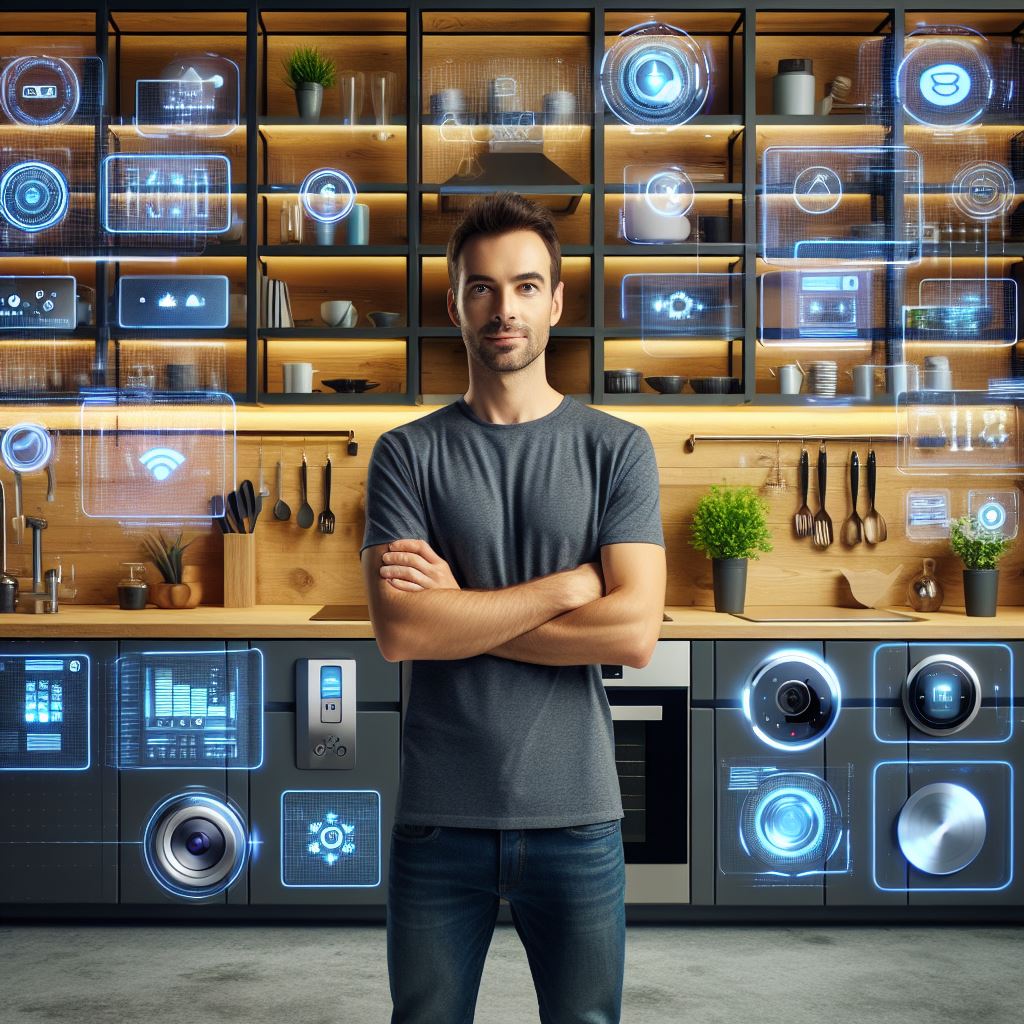Introduction
Smart kitchen tech uses technology and internet connectivity to boost efficiency, convenience, and automation in kitchen appliances and devices.
Smart kitchen tech offers numerous advantages, such as streamlined meal preparation, improved energy efficiency, enhanced safety, and customized cooking settings.
It enables users to control and monitor their kitchen appliances remotely through smartphones and voice commands.
With features like automated inventory management and recipe suggestions, smart kitchen tech can simplify grocery shopping and meal planning.
Additionally, it provides real-time data and analytics, promoting healthier cooking habits and reducing food waste.
Smart kitchen tech transforms daily life, offering flexibility and time savings, turning the kitchen into an innovative, connected hub.
As technology continues to advance, the adoption of smart kitchen tech is on the rise.
Smart refrigerators, ovens, and microwaves, along with intelligent coffee makers and air fryers, offer endless possibilities for a connected kitchen.
Smart kitchen tech transforms cooking with smartphone apps, enabling appliance control, monitoring, and access to vast recipe libraries.
These technologies transform kitchens into modern, intelligent spaces, catering to individuals’ needs and preferences with convenience and efficiency.
Let’s delve into smart kitchen tech, examining its impact on daily life in the following sections.
Overview of smart kitchen tech
Various smart kitchen devices and technologies
- Smart Refrigerators: These refrigerators have touchscreen displays, cameras, and can connect to the internet. They allow users to manage grocery lists, browse recipes, and track expiration dates.
- Smart Ovens: These ovens can be controlled remotely using smartphones or voice assistants. They offer features like temperature control, recipe recommendations, and notifications when the meal is ready.
- Smart Cooktops: These cooktops utilize induction technology and have sensors that detect the size and shape of utensils, ensuring efficient heat distribution. They also come with built-in timers, safety locks, and temperature controls.
- Smart Dishwashers: These dishwashers have sensors that measure the level of dirtiness and adjust the duration and intensity of the wash accordingly. They can also be controlled remotely and provide maintenance alerts.
- Smart Coffee Makers: These coffee makers can be programmed to brew coffee at specific times. They can also be connected to smartphones and allow users to customize their coffee preferences.
- Smart Sous Vide Cookers: These devices cook food by placing it in airtight bags and submerging it in a water bath with precise temperature control. They can be controlled and monitored remotely.
- Smart Air Fryers: These devices use hot air circulation to cook food with less oil. They offer presets for various dishes and can be controlled through smartphones or voice assistants.
- Smart Slow Cookers: These cookers can be controlled remotely and offer features like temperature adjustments, timers, and automatic keep-warm functions. They allow for convenient meal planning and preparation.
Examples of popular smart kitchen tech products in the market
- Amazon Echo Show: This smart device has a built-in display and can assist in managing grocery lists, showing recipes, and providing step-by-step cooking instructions.
- Samsung Family Hub Refrigerator: This smart refrigerator has a large touchscreen display, cameras inside to view the contents remotely, and can be connected to smart appliances for seamless control.
- June Oven: This smart oven comes with an HD camera and built-in AI that recognizes the food being cooked, recommends cooking modes, and provides real-time cooking updates through a smartphone app.
- Anova Precision Cooker: This smart sous vide cooker can be controlled through a smartphone app, allowing users to precisely cook meats, vegetables, and more with ease.
- Instant Pot Smart WiFi: This smart pressure cooker has built-in WiFi capabilities, allowing users to control and monitor the cooking process remotely through a smartphone app.
With the rise of smart kitchen technology, cooking and meal preparation have become more convenient and efficient.
These devices and technologies offer enhanced control, automation, and connectivity, making it easier for users to manage their kitchen activities.
From refrigerators that can create shopping lists to ovens that can recommend recipes, the possibilities are endless.
Smart kitchen tech not only saves time and effort but also improves the overall cooking experience.
Read: Minimalism in 2024: Sleek & Simple Interiors
Advantages of smart kitchen tech
In the ever-evolving landscape of modern living, the integration of smart kitchen technology has become a revolutionary force, redefining how we approach our culinary endeavors.
From time-saving capabilities to enhanced safety features, the advantages of smart kitchen tech are reshaping the heart of our homes.
Time-saving capabilities
One of the most compelling benefits of smart kitchen technology is its ability to save precious time.
Smart appliances, equipped with advanced automation and connectivity, streamline various tasks.
Imagine a refrigerator that suggests recipes based on its contents, or an oven that preheats itself as you head home.
These innovations minimize manual efforts, allowing you to focus on the joy of cooking rather than the logistics.
Energy efficiency and cost-saving features
Smart kitchen tech doesn’t just cater to your convenience; it’s also a boon for the environment and your wallet.
Energy-efficient appliances, coupled with intelligent systems that optimize usage patterns, contribute to reduced energy consumption.
From smart thermostats regulating oven temperatures to sensors monitoring refrigerator doors, these features translate into tangible cost savings and a smaller ecological footprint.
Improved cooking convenience and precision
Precision in the kitchen is an art, and smart technology has elevated it to new heights.
Smart kitchen devices, equipped with sensors and artificial intelligence, ensure precise cooking temperatures and timings.
Automated cooking processes, such as smart stovetops that adjust heat levels automatically, guarantee consistently delicious results.
The kitchen becomes a space where technology works seamlessly to enhance the culinary experience.
Enhanced kitchen safety and security
Smart kitchen tech isn’t solely about convenience; it’s also about safety.
With features like flame detection on smart stovetops and automatic shut-off mechanisms, the risk of kitchen accidents is significantly reduced.
Moreover, connected security systems allow you to monitor your kitchen remotely, providing peace of mind when you’re away from home.
In short, the advantages of smart kitchen tech extend beyond mere gadgetry.
They redefine the kitchen as a space where time is respected, resources are conserved, precision is perfected, and safety is paramount.
As we embrace these advancements, our kitchens become not only smarter but also safer and more efficient, enriching our culinary experiences in ways we never thought possible.
Read: Automated Systems for Efficient Living

Integration with other smart home systems
How smart kitchen tech can be synchronized with other smart devices
In today’s world, technology is seamlessly integrated into every aspect of our lives, and the kitchen is no exception.
Smart kitchen tech is designed to work in harmony with other smart home systems, creating a connected and efficient living environment.
With the use of cutting-edge technologies such as Wi-Fi, Bluetooth, and IoT (Internet of Things), smart kitchen devices can communicate with each other and with other smart devices throughout the home.
This synchronization enables homeowners to control and automate various tasks, enhancing the overall convenience and functionality of their kitchen.
Benefits of having a connected smart home ecosystem
Having a connected smart home ecosystem offers numerous benefits to homeowners, and the kitchen is one of the key areas where these advantages are realized.
Firstly, by integrating smart kitchen tech with other smart devices, homeowners gain greater control over their appliances and the overall kitchen environment.
This enables them to remotely monitor and adjust settings, which is particularly useful for busy individuals who are constantly on the go.
Secondly, a connected smart home ecosystem promotes energy efficiency.
By synchronizing various appliances, homeowners can optimize energy usage and reduce wastage.
For example, a smart oven can communicate with a smart thermostat, allowing for automatic temperature adjustment based on occupancy, weather conditions, or predefined schedules.
Furthermore, a connected smart home ecosystem enhances home security.
By integrating smart kitchen tech with security systems, homeowners can receive real-time notifications or alerts if there are any unusual activities in the kitchen area.
This enables them to take immediate action and ensure the safety of their home and loved ones.
Examples of interconnected smart home systems
The possibilities for integrating smart kitchen tech with other smart devices are nearly endless.
Here are a few examples of interconnected smart home systems that can transform your kitchen into a futuristic and efficient space:
- Smart lighting: By integrating smart kitchen lighting with motion sensors, homeowners can create a hands-free environment where lights automatically turn on or off as they enter or leave the kitchen.
- Voice assistants: Smart kitchen tech can be synchronized with voice assistants such as Amazon Alexa or Google Assistant. This allows users to control appliances, set timers, and access recipes using voice commands.
- Smart refrigerators: These high-tech refrigerators can sync with grocery shopping apps, keeping track of food inventory, providing recipe suggestions based on available ingredients, and even ordering groceries automatically.
- Home automation hubs: A centralized home automation hub can connect various smart devices in your kitchen, allowing for seamless control and coordination. It serves as a central command center for all your connected appliances.
- Smart home security systems: By integrating smart kitchen tech with security systems, homeowners can receive alerts on their smartphones if there are any potential safety risks, such as gas leaks or fire hazards.
In essence, the integration of smart kitchen tech with other smart home systems offers immense benefits to homeowners.
It enhances convenience, energy efficiency, and home security, transforming the kitchen into a connected and efficient space.
With the endless possibilities and advancements in technology, the rise of smart kitchen tech is undoubtedly shaping the future of modern homes.
Read: AI in Construction: A Game Changer
Current trends and innovations in smart kitchen tech
As technology continues to evolve, we are witnessing the rise of smart kitchen tech that is transforming the way we cook and manage our kitchens.
In this section, we will explore the current trends and innovations in smart kitchen tech.
Voice-controlled assistants and smart speakers
One of the most popular trends in smart kitchen tech is the integration of voice-controlled assistants and smart speakers.
With the help of virtual assistants like Amazon’s Alexa or Google Assistant, users can now control their kitchen appliances using simple voice commands.
For example, you can ask the assistant to preheat the oven or start brewing coffee without even touching a button.
Smart speakers, such as Amazon Echo or Google Home, have become an essential part of the modern kitchen.
Not only can they play music or answer questions, but they can also provide cooking timers, conversions, and even read out recipes step-by-step.
These voice-controlled devices make multitasking in the kitchen much easier and more efficient.
Internet of Things (IoT) and cloud connectivity
Another significant trend in smart kitchen tech is the integration of Internet of Things (IoT) and cloud connectivity.
IoT refers to the interconnectivity of various devices through the internet, allowing them to communicate with each other and the user.
In the context of the kitchen, this means that appliances, such as refrigerators, ovens, or coffee makers, can be remotely controlled and monitored.
For example, with IoT-enabled smart kitchen appliances, you can receive real-time notifications about food spoilage, adjust temperatures, or even reorder groceries automatically.
The ability to connect kitchen devices to the cloud opens up a world of possibilities for automation, data analysis, and remote management.
AI-powered cooking and recipe recommendations
Artificial Intelligence (AI) has also made its way into the kitchen.
AI-powered cooking appliances and recipe recommendation systems are becoming increasingly popular.
These systems use machine learning algorithms to analyze cooking patterns, ingredient combinations, and user preferences to provide personalized recipe suggestions.
Imagine having a smart oven that can adjust cooking time and temperature based on the recipe you selected.
AI-powered cooking appliances can also learn from your habits and make suggestions for healthier alternatives or help you reduce food waste.
Smart refrigerators and pantry management systems
Smart refrigerators and pantry management systems are yet another advancement in smart kitchen tech.
These appliances come equipped with cameras, sensors, and barcode scanners to keep track of the items stored inside.
They can automatically create grocery lists or send alerts when certain products are running low.
Some smart refrigerators even have the ability to suggest recipes based on the ingredients you have on hand.
With the help of mobile apps, users can remotely access the content of their refrigerator or pantry, ensuring that they never run out of essential items.
Basically, the rise of smart kitchen tech has brought about numerous exciting innovations.
Voice-controlled assistants and smart speakers, IoT and cloud connectivity, AI-powered cooking, and smart refrigerators are just a few of the current trends transforming our kitchens.
These advancements make cooking more convenient, efficient, and enjoyable, bringing us one step closer to the kitchens of the future.
Read: Smart Homes: Latest Tech in Modern Design
Challenges and considerations
The proliferation of smart kitchen technologies has undoubtedly transformed the way we approach cooking and meal preparation.
However, as we embrace the convenience and efficiency of these innovations, it is crucial to address the challenges and considerations that accompany this technological revolution.
Privacy and Data Security Concerns
One of the primary concerns surrounding smart kitchen tech is the potential invasion of privacy and the security of personal data.
As smart appliances become more interconnected, there is an increased risk of sensitive information falling into the wrong hands.
Manufacturers must prioritize robust encryption protocols and implement stringent privacy policies to safeguard user data.
Additionally, users need to be vigilant about granting permissions and regularly updating security settings to minimize the risk of unauthorized access.
Cost and Accessibility Barriers
While smart kitchen technology offers exciting possibilities, the associated costs may pose a barrier for many consumers.
High-end smart appliances often come with premium price tags, limiting accessibility for budget-conscious individuals.
Manufacturers and developers must focus on creating more affordable options without compromising quality.
This inclusivity will be vital in ensuring that the benefits of smart kitchen tech are accessible to a broader demographic, fostering widespread adoption.
Compatibility with Existing Kitchen Appliances and Infrastructure
Integrating smart devices seamlessly into existing kitchen setups presents another significant challenge.
Many households already possess traditional appliances that may not be compatible with the latest smart technologies.
Developers must work towards creating universally compatible systems or providing cost-effective retrofitting solutions.
This will not only ease the transition for existing homeowners but also encourage the incorporation of smart features into a wider range of kitchens.
Therefore, while the rise of smart kitchen tech brings numerous advantages, it is essential to navigate the challenges effectively.
Addressing privacy concerns, promoting affordability, and ensuring compatibility are key factors in fostering a sustainable and inclusive smart kitchen ecosystem.
By tackling these issues head-on, we can pave the way for a future where smart kitchen technologies enhance our lives without compromising essential values.
Future implications and potential developments
Growing Market for Smart Kitchen Tech
The surge in smart kitchen technology shows no signs of slowing down.
As our homes become increasingly interconnected, the smart kitchen tech market is poised for exponential growth.
Consumers are recognizing the convenience and efficiency these innovations bring to their culinary routines.
Smart refrigerators alert when groceries are low. Voice-activated assistants guide you through recipes, meeting the soaring demand.
Leading the charge are tech giants and kitchen appliance manufacturers, investing heavily in research and development to bring cutting-edge products to the market.
Smart kitchen tech integrates appliances for seamless communication, streamlining tasks, and enhancing user experience, moving beyond mere gadgets.
Predictions for Advancements in Smart Kitchen Tech
Looking ahead, the future of smart kitchen tech promises even more sophistication.
Artificial intelligence (AI) and machine learning will play pivotal roles, enabling devices to learn and adapt to individual preferences.
Imagine a kitchen that anticipates your dietary needs, suggests recipes based on your health goals, and even orders ingredients for you.
Improving connectivity seamlessly integrates smart kitchen tech with other home devices, creating a cohesive, intuitive environment.
The next frontier may involve incorporating augmented reality (AR) and virtual reality (VR) into the cooking experience.
Wear AR glasses projecting holographic recipes on your countertop. Use VR simulations for hands-on practice in a virtual kitchen.
These advancements are not just about making cooking more efficient; they aim to make it a truly immersive and enjoyable experience.
Impact on Consumers, Kitchen Design, and Cooking Habits
The widespread adoption of smart kitchen tech is reshaping how consumers interact with their kitchens.
With devices handling routine tasks, individuals can focus on creativity and exploration in the kitchen.
Kitchen design is evolving to accommodate these changes, with integrated charging stations, sensor-activated faucets, and intelligent storage solutions becoming commonplace.
Cooking habits are undergoing a transformation, with individuals embracing new cooking techniques and experimenting with diverse cuisines.
Smart kitchen tech, increasingly accessible, empowers everyone to achieve gourmet cooking, democratizing culinary expertise for all.
All in all, the rise of smart kitchen tech is not just a trend; it’s a paradigm shift in how we approach cooking and kitchen management.
The future holds exciting possibilities, from personalized AI-driven experiences to immersive AR-enhanced cooking environments.
As the market continues to expand, the smart kitchen of tomorrow promises to revolutionize the heart of our homes.
Conclusion
In the ever-evolving landscape of technology, the kitchen has not remained untouched.
Smart kitchen tech revolutionizes our homes, turning the heart into an innovative hub with remarkable transformation.
From intelligent appliances to connected devices, our kitchens have become smarter and more efficient than ever before.
Smart kitchen tech has brought about a myriad of benefits, simplifying daily tasks and enhancing our overall cooking experience.
The integration of artificial intelligence and internet of things (IoT) technologies has paved the way for seamless communication between devices.
We can now control our ovens, refrigerators, and even coffee makers with a simple voice command or a tap on our smartphones.
Increased connectivity not only saves time but also enhances energy efficiency, cuts waste, and lowers utility bills.
The precision and accuracy offered by smart kitchen appliances have elevated our culinary skills.
Ovens, with temperature control, transform novices into culinary maestros.
Smart scales ensure precise measurements, while cooking apps offer step-by-step guidance.
kitchens empower busy individuals, enabling them to effortlessly handle culinary tasks without compromising quality, thanks to convenience and time-saving features.




